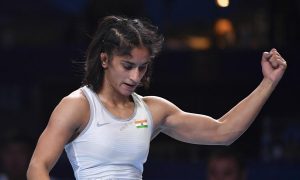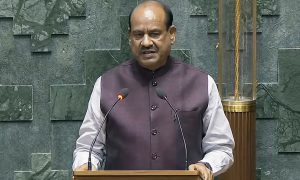Sakshi Malik’s opponent, her sister-in-law Isha, is in a tangle. Isha is using all her power to free herself from a seized left leg and a right leg precariously close to the red-zone of the wrestling mat. So Isha does that comes naturally to a fighter—she counters. She leans over and tries to push Sakshi back. But the grip that holds her is strong and firm. For it is, after all, the grip of an Olympic medallist.
At this very moment, Sakshi stops play and snaps at her sparring partner. “Kya kar rahi hai? Misbalance ho rahi hai. (What are you doing? You are losing your balance),” she says. “You will trip over. Give the opponent two points, or else you will end up conceding four.”
Here was an important lesson, particularly close to Sakshi’s wrestling persona: an ability to strategically concede. It is a hard lesson to learn, this split second instinct, this freedom of making a gambit with the belief that those lost points could be made up for in the dregs of the contest. It is this intrepid composure that once took Sakshi from being a nobody to a household name.
Not once, not twice, but on three separate occasions in the Rio Olympics, Sakshi clamped shut the jaws of defeat and emerged with her neck intact and a bronze medal draped around it. Three years later, Sakshi is trying to rediscover the belief that shaped her. As she coached Isha, she was coaching her 26-year-old self to be that epitome of fearlessness she once was; a girl that twice conceded two-pointers in the medal round of Rio, at one stage even trailing 0-5, only to turn it around in the nick of time.
That Olympic medal gave her everything, but it took away her freedom as a fighter.
“My mind got cluttered with thoughts,” Sakshi says. “What if I attack like before and because of that I am not successful? What if I attack and my opponents score more points than me? What if I lose and don’t win a medal? These thoughts are always on my mind.
“This need to win has held me back,” says Sakshi. “If they weren’t on my mind, if these thoughts stop coming, that’ll help me give my 100 per cent again.”
Sakshi believes she is getting back to that place where she could fight without being burdened by her own expectations, and she has an opportunity to test that out. On Sunday, she wrestles in the trials to try and make the cut for the World Championships in Kazakhstan two months from now. The top six from the Worlds win Olympic quotas for their countries. Though Sakshi could possibly have two more attempts at Olympic qualification if she does not make the cut at Kazakhstan, finishing in the top six there would be a personal landmark for her—she has never finished that high up at the Worlds.
But then that’s not a thought she wants to entertain. Or even the thought that she is a reigning Olympic medallist.
Often, Sakshi has noticed, when her mind is cluttered, her feet turn heavy.
At the Asian Championships last month, it was nerves that stopped her from playing her come-from-behind game in the quarter-final against Yukako Kawai. The young girl from Japan has become Sakshi’s nemesis; the 21-year-old outclassed her at the 2018 Worlds as well.
At the Asian Championship, Sakshi paid the price for trying to hold on to her points for a win. With two minutes left on the clock, Yukako brought Sakshi down and the two were locked in a tussle for nearly a minute. Yukako gradually firmed her grip on Sakshi’s body, and closed out the bout with more than 60 seconds to spare.
“I was defensive. You cannot allow your opponent to play to her strength and style. If I play to my strengths for full six minutes, I can beat anyone,” Sakshi says, using the akhada phrase for defensive play, ‘bach bach ke khelne lagi’. “What I had to do was enter my zone of attack and keep on attacking. That’s my game and that once used to be my mindset.”
Sakshi had now started losing the way Sakshi once used to win. At the semi-finals of the Asian Games last year, Sakshi was up 4-0 against Kyrgyzstan’s Aisuluu Tynybekova, who she had defeated in the bronze medal round at the 2016 Olympics. But this time Aisuluu attacked with purpose while Sakshi played for time and lost.
“When I beat the same girl in the Olympics, people said ‘what a performance’. And when I lost to her from a similar situation, my performance was suddenly torn apart,” she says. “I can’t go and explain to everyone what wrestling is, the nuances of the game, what an athlete goes through in a match.”
The nuances of wrestling are best understood by a wrestler, but there is no doubt that this is a sport of slender margins—a hold here and a twitch there can be the difference between winning and losing. In Rio, Sakshi had fought back with determination. After the first period Aisuluu had taken a comfortable lead by twice attacking Sakshi’s legs. In the second, Sakshi stepped it up just when Aisuluu perhaps began thinking she had done enough. The Indian muscled her way to level the scores with just nine seconds left on the clock. A few blinks of an eye later, she had done what Aisuluu couldn’t –become her country’s first woman wrestler to win an Olympic medal.
“I have been dealing with expectations ever since,” she says. “Since then, my thought has always been ‘I have an Olympics medal and because of that I have to medal at this event’. At the big events especially, that thought has been a constant.”
Wrestling is not only in Sakshi’s blood, but runs through the veins of her new family as well. When at home in Rohtak, she wakes up to the view of a wrestling -centre built and named after her father-in-law, Satyavan Pehelwan. Here she trains with wrestler-husband, Satyawart Kadian, and often Kadian’s sister Isha joins them. The three sparring wrestlers are sometimes coached by Satyavan, an Olympian himself.
Sakshi and Satyawart have known each other for a long time, and nursed ambitions of achieving success together. So, when the two of them medalled—bronze, both—together at the 2019 Asian Championships in Xian (China) this April, the couple were over the moon.
“These are the moments that one lives for,” says Sakshi.
Satyawart’s opinion as he watches Sakshi practising on the mat, should set her mind a little at ease. “Strong, powerful attacks,” he says. “She is again wrestling with a free mind,” says Satyawart.
“We see each other’s matches and analyse. When someone who is close to you, and can give you an honest opinion about your game, it helps,” he says.
The weight of the Olympic medal may have kept her from winning more frequently, but Sakshi says that since 2016, her understanding of her sport has improved a lot.
“Ab mujhe kushti ki samajh hui hai (I have now begun to understand wrestling),” she says. “Earlier I used to just fight. Even when I won the Olympics medal, it was because of my hard work and passion. But now I can analyse the finer points. When to use more power so the opponent cannot counter. How to free myself from an opponent’s grips. Things like that. But what I understand now is thirty per cent. Maybe 40 per cent. There are so many variations in wrestling, so many ways to get entangled and to bail yourself out,” Sakshi says.
“My coach used to say, ‘Even when you are done with this sport, you won’t understand it all.’
“But what I can still do is keep improving.”
Sakshi has the services of a new personal coach in Fanel Carp, who was a coach with Romanian Wrestling Federation. “In 2015, when I qualified for Rio de Janeiro, I could not believe it. That itself was a dream come true. At that point winning a medal wasn’t even a dream. But now, I want to not just qualify but also win in Japan.”
Yet that thought must be tempered, allowed to recede. Sakshi recalls her bronze medal match after her defeat to Japan’s Kawai in Asian Championships. She found herself in a do-or-die situation, just as she had in Rio. This time, fighting both Hyon Gyong Mun of North Korea and the ticking clock, Sakshi turned around a 6-7 trail with an attacking two-pointer at the very end.
Her another big victory of the year came at Dan Kolov meet in Bulgaria where she stunned reigning world champion Petra Olli (65kg) of Finland 4-1.
“I love the thrill of wrestling. It’s not that I am Olympic medallist so I will play in only major competitions and avoid smaller competitions for the fear that I might lose. Medal or not, I will keep playing.”




























 WhatsApp us
WhatsApp us